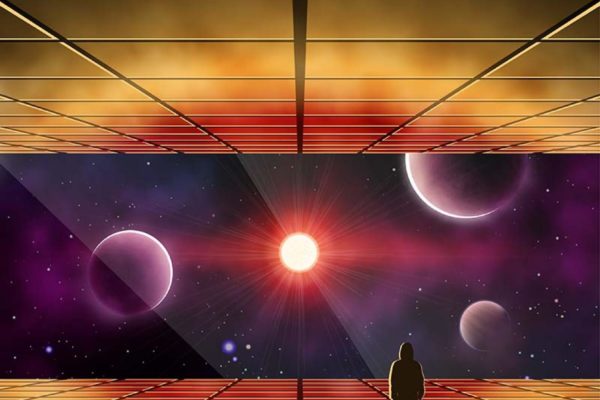“We did it!” announced physics alumnus David Reitze to the world on February 11, 2016 – breaking the news of perhaps the biggest scientific discovery of our time. Reitze and his team at the Laser Interferometer Gravitational-Wave Observatory (LIGO) had found the first-ever detection of gravitational waves. Newspapers around the world reported the groundbreaking news. “Gravitational Waves Detected, Confirming Einstein’s Theory,” published The New York Times. “A triumph for big science,” said the BBC. “Cosmic Breakthrough,” reported The Washington Post. “Science’s new frontier,” stated Al Jazeera.
The gravitational waves were detected by twin LIGO detectors, located in Livingston, Louisiana, and Hanford, Washington.
The waves LIGO recorded were from a storm in space-time created by two swirling black holes merging to become one, “arriving at the earth from a cataclysmic event in the distant universe,” LIGO said in its announcement. “This confirms a major prediction of Albert Einstein’s 1915 general theory of relativity and opens an unprecedented new window onto the cosmos.”

Now that researchers know that they exist, the hope is that gravitational waves could open the door to answering some of the biggest mysteries in science, such as: How did the universe begin?
Reitze started his career as a Ph.D. candidate at The University of Texas at Austin. It was a class with famed theoretical physicist John Wheeler that first sparked his interest in gravitational waves. “I was motivated purely by curiosity” he said. “I learned a lot about what it meant to be a physicist. Not just solving equations and problem sets, but thinking about problems from different ways.” This lesson, he said, stuck with him during his 20 years working on LIGO.
This past week Reitze returned to campus to talk about what he calls “the dawn of the new astronomy.”

“Physics of today is pretty sophisticated,” said Reitze, “but there is a lot we don’t know.” He sees these waves as messengers that tell us things we can’t get by any other current detection method. “Gravitational waves are the only way in fact to look at the birth of the universe,” he noted. While LIGO is unlikely to observe anything from the big bang, future gravity wave detectors could make it possible.
Exploring this fundamentally new way of looking at the universe opens doors for the next big scientific theories and methods. The LIGO experiment pushes the limits of everything it touches. The 50-year-long experiment was a “tour de force in engineering,” Reitze said, acknowledging the huge collaboration behind the discovery. The observatory uses “the most sensitive measuring device in the world, with the best lasers and purest form of light.”
The next step is to expand the experiment globally – detectors are currently being built in India, Italy and Japan.
“Every time you turn on a new instrument, look through a microscope or a telescope, you discover things you could never anticipate,” said Reitze. Gravitational waves, he claimed, have the potential to open astronomy with the same advancement that Galileo’s telescope did 400 years ago – pushing discovery into new parts of space and beyond.
David H. Reitze (Ph.D., Physics ’90)
2016 College of Natural Sciences Distinguished Alumnus
Dr. David H. Reitze is the executive director of the Laser Interferometer Gravitational-Wave Observatory (LIGO), a research professor at the California Institute of Technology and a professor of physics at the University of Florida.




